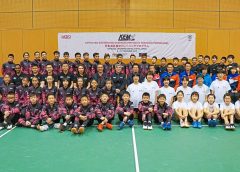Championing future badminton stars
SPENDING one week in Japan did not come easy for 30 aspiring shuttlers and it certainly did not involve stuffing themselves with some of the best sushi in town.
The primary school-going group, involved for the seventh edition of the Astro Kem Badminton (AKB), powered through gruelling training sessions headed by Japan’s National Junior head coach Hiroyuki Hasegawa during their week-long stay at the Ajinomoto Training Centre.
Prior to their visit to Tokyo, the participants, mostly 12-year-olds, went through various rounds of auditions before being picked for the camp.
There were six selection camps held around the country starting in Penang, Kota Baru, Kelantan, Johor Baru, Kuala Lumpur, Kota Kinabalu, Sabah before ending in Kuching, Sarawak.
In the final week before hopping onto the plane, head coach Chan Chong Ming gave the children a pep talk to prepare them for their Japanese mission.
“Training here is tough, we have to wake up very early every morning. We hardly got any rest but we are slowly starting to enjoy it because I like badminton very much, ” said Chee Hong Wei adding that he was usually awake by 6am.
Hong Wei said early mornings were the only free time the participants had before training sessions began.
“Some of us rest while others play games on their phones or call their parents, ” said Hong Wei, who is part of the Johor state squad.
At 7.30am, all the participants would have woken up, showered and ready to head down to the common dining hall for breakfast.
An hour later, the group would adjourn to the third floor where the badminton courts are located.
The three-storey building also houses training facilities for gymnastics, volleyball, handball, basketball, judo, table tennis, boxing, weightlifting and wrestling.
Just before entering the badminton training hall, the participants are required to remove their regular sneakers for their badminton shoes, while those who are not playing the game have to put slip-on sandals provided by the centre.
Once in the hall, the children would race to put up the nets for all 10 courts that are utilised after a 30-minute warm-up session.
On day two, when Shaneesa Shahidi thought she had gotten used to the training sessions, the Japanese coaches had a different plan.
“We had to do different warm-ups and also run within a given time.
“Sadly most of us failed and did not meet the cut off time, a handful also struggled with muscle cramps and eventually gave up, ” said Shaneesa from Melaka’s SK Bertam Hulu, adding that it was an embarrassing afternoon.
Low Hao Feng from SJKC Chiao Nan in Kuala Lumpur agreed,
adding that physical training and discipline was not easy but if given enough time to train he would definitely be able to perform.
“Our legs were hurting on the first day but it got better after, ” said Low, who aspires to be the next Lee Chong Wei.
The Japanese coaches were upset with their performance but the group later recovered and continued with the training session.
“We were also told not to run off to our water bottles so regularly, at one point we were only able to drink every two hours.
“It wasn’t like how we are used to at home, ” she said.
Besides the participants, the organisers also included two mentors Kang Khai Xing, 13 and Chew Jia Wen, 16 to join the trip.
The duo, previous participants of AKB, were tasked with assisting new participants throughout the programme.
At each session, Hasegawa would be either watching from afar or going to the court to show the group what he wanted them to do.
His assistants Takada Ida, Maiko Ichimiya, Akira Chiba, Yukie Shibata and former Malaysian doubles star Lee Wan Wah were all on their toes watching and guiding the participants alongside AKB coaches Chow Foo Wah and Kok Wing Soon.
The last four days of the camp saw the Japanese junior team joining the participants to spice up the training sessions, allowing the Malaysian side to broaden their experience further.
They played friendly matches where scores and results were tabulated on a whiteboard to ensure the participants did not take the games lightly.
After every session, Hasegawa and Chong Ming would comment and advise the young players on their mistakes and what they should be doing to improve their game.
On the final day of the programme, the students went through a final round of friendly matches where they had a chance to play both doubles and singles matches against the host country before bidding a tearful farewell to their newfound friends.
“The Malaysian team struggled when they first came but they grew stronger every day and I can see they have a lot of potential in them, ” said Hasegawa, who trains children from ages 10 onwards.
Yayasan Astro Kasih chairman Tan Sri Azlan Zainol and Astro chief executive officer Henry Tan were also present to hand out certificates to the participants.
AKB is run by Astro Kasih, Astro’s corporate social responsibility arm, with the aim of finding and developing future badminton champions for the nation.
“We believe through this programme we are able to expose the kids to the sport not just locally but at an international stage where they are up against some of the best junior players of the same age, ” said Henry, who hoped the children would benefit from it and perhaps become the next national champion.
Henry said Japan provided the participants with world-class facilities during the week-long programme and it was hard to match such standards especially when the country would be hosting the upcoming summer Olympics in August.
“We want the children to learn new skills, the culture, language and have more friends who have the same interest as them.
“It is a global world now so it is very important for the participants to get that exposure at a young age, ” he said while visiting the participant’s dorms and dining area.
Henry said more than 2,600 children signed up for the programme but only 60 were shortlisted the figure was trimmed down further.

